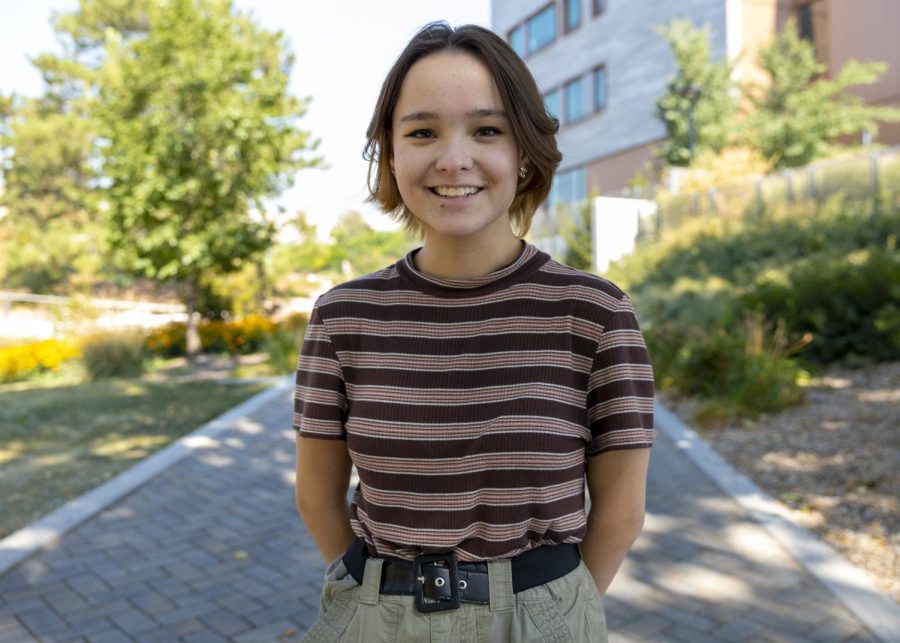Lien: Anti-Asian Racism is Far From Over
Kayla Lien at University of Utah in Salt Lake City, Utah on Sept. 9, 2022. (Photo by Amen Koutowogbe | The Daily Utah Chronicle)
September 16, 2022
COVID-19 affected the entire world, and besides the loss of millions of people and ever-present symptoms, it greatly tested the resilience of the Asian-American community. People love the food, the culture and the fashion — but not the people. Although the #StopAsianHate hashtags have disappeared from social media, anti-Asian racism hasn’t gone away.
Twenty-one percent of Americans still believe that Asian Americans are partially responsible for COVID-19. Many also believe that hate crimes against Asian Americans have decreased between 2020 and 2021, though they actually increased 339%. One in six Asian-American adults experienced a hate incident in 2021, up from one in eight in 2020.
During the most concerning time of the pandemic, it became apparent that Asians and Asian Americans were at risk for more than the virus. “When everything started happening, and like all the Asian hate crimes kept happening, I remember my dad did not let me go outside,” said Tate Vongsavath, a student at Weber State University. “It was a very scary time for our physical well-being in both physical health, like not getting sick, and just also what other people were going to be doing to us.”
Asian fatalities from COVID-19 were staggering. Fifty-seven percent were more likely to be hospitalized and 49% were more likely to die compared to white people of the same sociodemographic and health conditions. Asian Americans refused testing and hospital visits for fear of racist harassment, even with underlying conditions such as diabetes or stroke symptoms.
The use of hashtags like #StopAsianHate and #StopAAPIHate gained traction in 2021 after a gunman killed eight people, including six Asian women. The movement bred organizations like Stop AAPI Hate, which helped usher in new legislation addressing pandemic-occurring hate crimes, especially those committed against the Asian community.
Yet in the time since, the support for the movement has vanished. Vongsavath likens it to a trend.
“You know, I guess people are too worried about, ‘Let’s see, what’s the biggest thing right now?’” she said. “People are worried about everything.”
Vongsavath said once the sensationalism died, everyone got the memo to “stop supporting Asians — they don’t need our help anymore.”
Arissa Jenn, a freshman at the University of Utah, said she felt lucky to have been “pretty sheltered” her whole life in regards to Asian hate. Jenn cited “maybe some microaggressions,” but for the most part, she’s managed to avoid a majority of negative experiences.
Anti-Asian racism may seem out of place here in comparison to places like San Francisco with high concentrations of Asian Americans. But discrimination and racist incidents occur in Utah and Salt Lake City. I lived 10 minutes from campus in 2020 at the height of the lockdown, and my family was once rudely awakened to anti-Asian hate when someone sent us hate mail for being Chinese. Before then, I had considered myself American, assuming that’s what others saw me as.
Clearly, I was wrong.
People in my extended family also reported getting harassed online for their ethnicity, and these incidents are cause for concern.
“My siblings and I are still afraid to cough in public, because as an Asian person, if you do … you’re, I don’t know, disrupting the peace,” Vongsavath said. “It’s so scary to do anything. Especially during the pandemic, anything that would indicate that you were sick or whatever, people would come after you.”
If a surge in COVID-19 cases arises or mask mandates are brought back, I worry that we will once again be the nation’s scapegoat. The violence exhibited in these hate crimes devastated the community, and the thought of these incidents resurging is harrowing.
I am tired of anti-Asian racism being left behind in discussions about racial discrimination. I am tired of having my mom send me articles about the newest hate crime, reminding me that I am Asian, not American. I am tired of griping on this topic which gets swept aside in conversations, because white people are uncomfortable having it. And mostly, I’m tired of feeling ashamed of my existence.
Your Asian friends, classmates, neighbors and cashiers have suffered over the course of these last two years. Don’t forget about us and what this community has gone through.










Nicole • Sep 20, 2022 at 8:53 pm
Such an important contribution! The Leopard staff will be reading this week!
John Hedberg • Sep 16, 2022 at 3:55 pm
Has anyone checked how racially biased this university is in its practices? (For you non-Marxist Chronicle journalists, this would be a major story to research and write about, incredibly important)
https://nypost.com/2022/08/03/higher-ed-vs-asian-students-in-supreme-courts-harvard-discrimination-case/
“Not a single college or university supported the Asian students. To the contrary, several dozen briefs were filed against SFFA on behalf of hundreds of colleges, universities, higher-education and professional-school associations, teachers unions, more than 1,000 professors and deans and even college basketball coaches.”
“One of the most striking things about these briefs is the openness with which colleges admit to having racial preferences and their complete lack of sympathy for the Asian victims of discrimination.”
It’s clear that we have a problem with racial discrimination in this country, but this racism seems to be excused when it’s practiced against particular out-groups, like people with Asian and Euro heritage.
Racism is judging another human being by external hereditary differences which they cannot change, but which change nothing about the quality and value of their humanity, which we all share equally.
‘Bout time we all recognize and acknowledge this fact.
“Love one another” is the only way any spaces ever really become “safe”, because we’re all children of that same Love, and when we acknowledge this, we tend to treat each other by that same high standard, as One, as family.
Just a thought to consider~
Best Regards, with Love,
J Hedberg